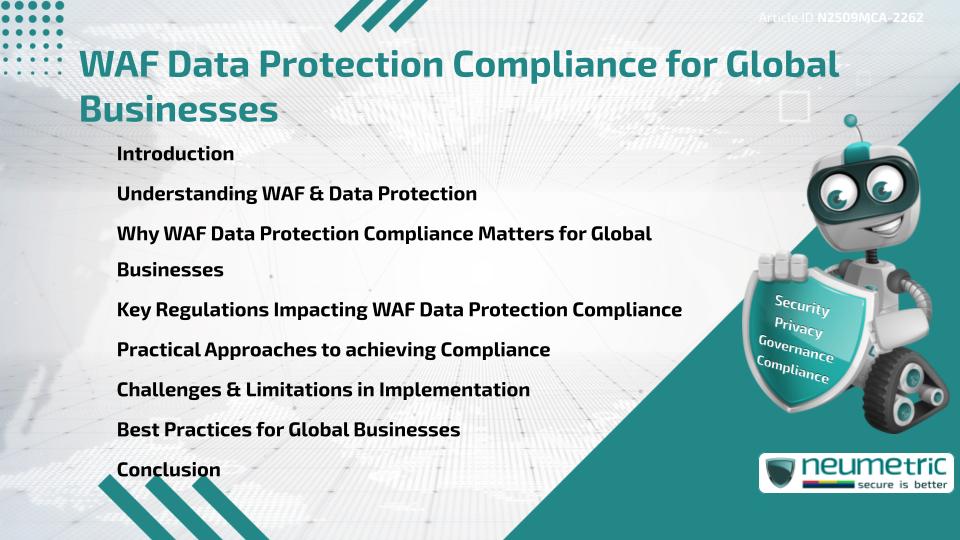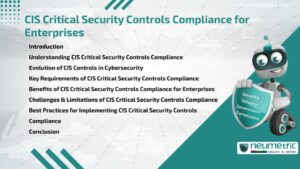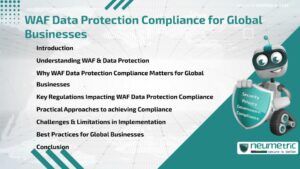Table of Contents
ToggleIntroduction
WAF Data Protection compliance is a crucial requirement for global businesses that handle sensitive Customer & corporate data. It ensures that Organisations remain aligned with international regulations, reduce Risks from Cyber Threats & maintain trust with Stakeholders. Businesses operating across different regions must address multiple standards, such as the General Data Protection Regulation [GDPR], California Consumer Privacy Act [CCPA], and Payment Card Industry Data Security Standard [PCI DSS]. This article explores the role of Web Application Firewalls [WAFs] in protecting data, the importance of compliance & practical approaches for achieving it.
Understanding WAF & Data Protection
A Web Application Firewall [WAF] acts as a protective barrier between users & web applications. It monitors, filters & blocks malicious traffic to prevent attacks such as SQL injection, cross-site scripting & data breaches. When integrated with strong Data Protection measures, a WAF supports compliance efforts by minimizing the Risk of unauthorized access & data loss. Think of a WAF as a security guard at a building entrance-screening visitors, rejecting suspicious ones & allowing only legitimate traffic to enter.
Why WAF Data Protection Compliance Matters for Global Businesses
Global businesses often handle massive amounts of personal & Financial data. Failure to meet compliance standards can lead to severe fines, reputational damage & legal consequences. WAF Data Protection compliance ensures:
- Regulatory alignment with international laws.
- Customer Trust, as people feel secure knowing their data is protected.
- Operational resilience, since compliant systems are less likely to be disrupted by cyber incidents. For example, under GDPR, Organisations can face penalties of up to four (4) percent of their global annual turnover for non-compliance. Such Risks highlight the need for strong compliance programs.
Key Regulations Impacting WAF Data Protection Compliance
Different regions impose unique standards, making compliance complex:
- GDPR (European Union): Requires secure processing of Personal Data & immediate reporting of breaches.
- CCPA (California, USA): Grants consumers rights to control how their data is collected & used.
- PCI DSS (global standard): Protects payment Cardholder Data through strict controls.
- HIPAA (USA): Focuses on safeguarding health-related information.
- ISO 27001 (international): Sets a Framework for managing Information Security. Each Regulation emphasizes accountability, transparency & proactive Risk Management. Businesses must map their WAF configurations to these legal requirements to achieve true compliance.
Practical Approaches to achieving Compliance
Waf Data Protection compliance requires both technical & organizational measures:
- Regular WAF configuration audits to ensure Policies align with Data Protection laws.
- Data Encryption in transit & at rest.
- Incident Response planning for rapid breach detection & notification.
- Employee Training to raise awareness of compliance obligations.
- Continuous Monitoring of traffic patterns to detect suspicious activity. By combining these measures, businesses can create a holistic compliance Framework that reduces Vulnerabilities.
Challenges & Limitations in Implementation
Achieving compliance is not without obstacles:
- Complex regulations: Navigating multiple laws across jurisdictions can be overwhelming.
- Resource constraints: Smaller businesses may lack the budget or expertise to maintain compliance.
- False positives in WAF detection: Overly strict configurations may block legitimate traffic.
- Evolving Threats: Cyber attackers constantly change their tactics, making static controls insufficient. These challenges underscore the need for ongoing investment in both technology & expertise.
Best Practices for Global Businesses
Global businesses can follow these Best Practices to maintain compliance:
- Centralize compliance management to track obligations across multiple jurisdictions.
- Adopt layered security models, where WAFs work alongside intrusion detection & Endpoint Protection.
- Conduct regular Penetration Testing to uncover weaknesses.
- Maintain documentation of compliance efforts for audits & regulators.
- Engage Third Party experts for independent validation of WAF effectiveness. These practices enable businesses to maintain Regulatory Compliance while improving overall Cybersecurity posture.
Conclusion
Waf Data Protection compliance is more than a legal requirement-it is a business necessity. By integrating WAFs into a broader compliance strategy, Organisations can protect Customer Data, meet international regulations & safeguard their reputation. While challenges exist, adopting Best Practices & maintaining continuous vigilance allows global businesses to stay ahead in the compliance journey.
Takeaways
- Waf Data Protection compliance combines legal, technical & organizational measures.
- WAFs play a critical role in preventing data breaches & ensuring regulatory alignment.
- Businesses face challenges such as complex laws & evolving Cyber Threats.
- Best Practices include centralized compliance, layered security & expert support.
FAQ
What is WAF Data Protection compliance?
It is the process of ensuring that a Web Application Firewall [WAF] is configured & managed to meet international Data Protection regulations.
Why is WAF Data Protection compliance important for global businesses?
It helps Organisations avoid legal penalties, maintain Customer Trust & reduce the Risk of data breaches.
Which regulations affect WAF Data Protection compliance?
Key regulations include GDPR, CCPA, PCI DSS, HIPAA & ISO 27001.
How does a WAF help with compliance?
A WAF filters & blocks malicious traffic, prevents unauthorized access & reduces the Likelihood of data breaches that would violate compliance standards.
What challenges do businesses face in achieving compliance?
Businesses often struggle with complex international laws, resource limitations, false positives & adapting to evolving Threats.
Can smaller businesses achieve WAF Data Protection compliance?
Yes, but they may need external support or managed security services to meet regulatory requirements effectively.
What are the Best Practices for maintaining compliance?
Best Practices include layered security, regular Audits, documentation & using Third Party validation.
Need help for Security, Privacy, Governance & VAPT?
Neumetric provides organisations the necessary help to achieve their Cybersecurity, Compliance, Governance, Privacy, Certifications & Pentesting needs.
Organisations & Businesses, specifically those which provide SaaS & AI Solutions in the Fintech, BFSI & other regulated sectors, usually need a Cybersecurity Partner for meeting & maintaining the ongoing Security & Privacy needs & requirements of their Enterprise Clients & Privacy conscious Customers.
SOC 2, ISO 27001, ISO 42001, NIST, HIPAA, HECVAT, EU GDPR are some of the Frameworks that are served by Fusion – a SaaS, multimodular, multitenant, centralised, automated, Cybersecurity & Compliance Management system.
Neumetric also provides Expert Services for technical security which covers VAPT for Web Applications, APIs, iOS & Android Mobile Apps, Security Testing for AWS & other Cloud Environments & Cloud Infrastructure & other similar scopes.
Reach out to us by Email or filling out the Contact Form…





